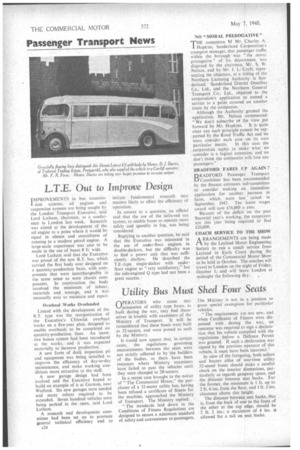L.T.E. Out to Improve Design
Page 26

If you've noticed an error in this article please click here to report it so we can fix it.
IMPROVEMENTS in bus transmis sion systems, oil engines and suspension systems are being sought by the London Transport Executive, said Lord Latham, chairman, at a conference in London last week. Research was aimed at the development of the oil engine to a point where it would be equal in silence and smoothness of running to a modern petrol engine. A large-scale experiment was also to be made in the use of buses 8 ft. wide.
Lord Latham said that the Executive was proud of the new R.T. bus, which carried the first body ever designed on a quantity-production basis, with components that were interchangeable in the same sense as were chassis components. In construction the body involved the minimum of labour. materials and wastage, and it was unusually easy to maintain and repair.
Overhaul Works Overhauled Linked with the development of the R.T. type was the reorganization of the Executive's Chiswick overhaul works on a five-year plan, designed to enable overhauls to be completed on quantity-production lines. An incentive bonus system had been introduced at the works, and it was expected materially to increase production.
A new form of dock inspection pit and equipment was being installed to improve the efficiency of day-to-day maintenance, and make working conditions more attractive to the staff.
A new garage design had been evolved and the Executive hoped to build an example of it at Garston, near Watford. Six new garages were needed and many others required to be extended. Seven hundred vehicles were being parked in the open, said Lord Latham.
A research and development committee had been set up to promote general technical efficiency and to A24 initiate fundamental research into matters likely to affect the efficiency of operation.
In answer to a question, an official said that the use of the infra-red ray system, to enable buses to operate more safely and speedily in fog, was being considered.
Replying to another question, he said that the Executive was interested in the use of under-floor engines in double-deckerS, but the difficulty was to find a power unit that was sufficiently shallow. He described the T.F.-type single-decker with underfloor engine as "very satisfactory," but the side-engined Q type had not been a great success. NO "MORAL PREROGATIVE"
THE contention bf Mr. Charles A. Hopkins, Sunderland Corporation's transport manager, that passenger traffic within the borough was "the moral prerogative" of his department, was disputed by the chairman, Mr. S. W. NelSon, and by Mr. J. L. Croft, representing the objectors, at a sitting of the Northern Licensing Authority in Sunderland. Sunderland District Omnibus Co., Ltd., and the Northern General Transport Co.. Ltd., objected to the corporation's application to extend a service to a point covered on another route by the companies.
Although the Authority granted the application, Mr. Nelson commented: "We don't subscribe to' the view .put -forward by Mr. Hopkins. It is quite clear any such principle cannot be supported by the Road Traffic Act and we must consider each case on its own
particular merits. In this case the corporation wants to make what We consider is a logical extension, and we don't think the companies will lose any passengers."
BRADFORD FARES UP AGAIN?
BRADFORD Passenger Transport Committee has been recommended by the finance estimates sub-committee to consider making an immediate application for another increase in fares, which were last raised in September, 1947. The latest wages award will cost £36,000 4 year.
Because of the .deficit on the past financial year's working, the ratepayers are this year being required to find 420,000.
COACH SERVICE TO THE SHOW
A RRANGEMENTS are being made by the Leyland Motor Engineering Society to run a coach service from Leyland tO Earls Court during the period of the Commercial Motor Show to be held in October. The coaches will travel to London on the night of Friday, October 1, and will leave London at midnight the following day.,












































































